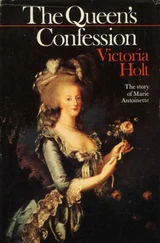Виктория Холт - Flaunting, Extravagant Queen
Здесь есть возможность читать онлайн «Виктория Холт - Flaunting, Extravagant Queen» весь текст электронной книги совершенно бесплатно (целиком полную версию без сокращений). В некоторых случаях можно слушать аудио, скачать через торрент в формате fb2 и присутствует краткое содержание. Жанр: Исторические любовные романы, на английском языке. Описание произведения, (предисловие) а так же отзывы посетителей доступны на портале библиотеки ЛибКат.
- Название:Flaunting, Extravagant Queen
- Автор:
- Жанр:
- Год:неизвестен
- ISBN:нет данных
- Рейтинг книги:5 / 5. Голосов: 1
-
Избранное:Добавить в избранное
- Отзывы:
-
Ваша оценка:
- 100
- 1
- 2
- 3
- 4
- 5
Flaunting, Extravagant Queen: краткое содержание, описание и аннотация
Предлагаем к чтению аннотацию, описание, краткое содержание или предисловие (зависит от того, что написал сам автор книги «Flaunting, Extravagant Queen»). Если вы не нашли необходимую информацию о книге — напишите в комментариях, мы постараемся отыскать её.
Flaunting, Extravagant Queen — читать онлайн бесплатно полную книгу (весь текст) целиком
Ниже представлен текст книги, разбитый по страницам. Система сохранения места последней прочитанной страницы, позволяет с удобством читать онлайн бесплатно книгу «Flaunting, Extravagant Queen», без необходимости каждый раз заново искать на чём Вы остановились. Поставьте закладку, и сможете в любой момент перейти на страницу, на которой закончили чтение.
Интервал:
Закладка:
‘Madame, those are the King’s orders.’
‘But we are not in France yet.’
‘You are the King’s subject, Madame.’
‘I … I … I am Dauphine.’
‘Yes, Madame, and therefore a subject of the King of France.’ Madame de Noailles firmly removed the ring.
‘What will you do with it?’ asked the little bride.
‘It shall be returned to your mother.’
‘Then I shall ask her to give it back to me, and when I am at the Court I shall tell the King I will not be deprived of my mother’s gifts.’
Madame de Noailles appeared not to be listening. It was as though she implied that what the Dauphine was saying was no concern of hers. She had been commanded to remove all that was Austrian from the Dauphin’s bride, and this she had done.
And as soon as the ring was off her finger, Antoinette felt desolation touch her. Now she was indeed far from home.
Her eyes brilliant with rebellious tears which she was holding in check with all the restraint of which she was capable, she turned to the door where Count Starhemberg was waiting to conduct her into the great hall.
She laid her hand on his arm, and in that moment the small slender girl looked like a queen. The rich skirts of her French dress, so becoming to her youth and beauty, rustled as she walked, and the French, who stood on the west side of the great table, which had been placed in the centre of the hall like a barrier between two countries, were touched by her youthful charm although their faces, stiff with formality, did not show this.
The furniture in the hall had been lent by the citizens of Strasbourg for this occasion, and the rich tapestries which adorned the walls helped to disguise the rough workmanship of the hastily constructed building. But the young girl did not notice the furnishings; she was only conscious of the solemn men on the west side of the table and her own countrymen and women who stayed so significantly on the east side.
The Count was leading her towards the table. Her legs were trembling and she wondered how she could have laughed so gaily and enjoyed all the festivities which had really been leading up to this moment.
The Count was ceremoniously drawing her round the table, and there was a deep silence in the room as all eyes were turned on her. She felt this was the most solemn moment of her life, far more solemn than the marriage ceremony had been. To her that had been like a piece of elaborate play-acting, for the man who had stood beside her had not been her husband.
Now that she had passed round the table and was on the west side, it was almost as though there was a sigh of relief from the watchers, as though they had expected her to refuse to take the necessary steps, or to lie on the floor and kick and scream her refusal to become a subject of King Louis and demand to be taken home to her mother, as she would have done when she was four years old.
Now they were ready to receive her – their Dauphine who would one day be their Queen.
One by one they approached her; they bowed; they kissed her hand. And when it was the turn of Madame de Noailles to curtsy, Antoinette could not hold back her tears. They began to fall silently.
Madame Noailles rose in alarm, and turned to one of the men in attendance.
He said: ‘The carriages are here. We should leave at once.’
Thus the ceremony was cut short that the quiet tears of the new Dauphine should not become noisy sobbing. Etiquette must be preserved at all costs.
So Marie Antoinette left the neutral territory of the Rhine and, as the bells of Strasbourg pealed forth, said her last goodbye to her old home and journeyed on to France.
In the apartment of the King of France Madame du Barry dismissed all attendants as she wished to be alone with the King, and the word of Madame du Barry was law at the Court of France.
Poor France! she was thinking. He is looking old to-day.
She liked to refer to him familiarly as ‘France’; it reminded her that he was the King and that because she wielded great power over him, she was, in a measure, ruler of the land. That was a pleasant thought for the daughter of a Vancouleurs dressmaker and, apart from a few uneasy moments, she was a contented woman. Nothing delighted her more than to receive her guests in her salon and to realise that they counted themselves highly favoured to be received thus by her, for it was understood that if they wished for honours at Court, it was to Madame du Barry they must look for them.
‘France’ had been good to her; he had provided her with a useful husband – none other than the Comte du Barry – who was, at the King’s command, ready to marry her and then remove himself from Court so that he never embarrassed any by his presence there, thus giving her the title of a great lady while the riches and honours were supplied by Louis. They were good to each other – she and Louis. It was true that he was sixty years old and looked it; not even Kings could live lives such as Louis Quinze had led and remain unmarked by their vices; she was twenty-seven and, if she were beginning to look a little raddled, she knew how to repair such ravages at her mirror; and those jewels and costly garments which were not supplied by Louis were bestowed upon her by those wishing for the King’s favour.
Since the death of Madame de Pompadour, some six years before, the Comtesse du Barry had been the most powerful woman at the Court of France.
She was a happy woman. It comes, she would tell herself, of having known less fortunate days. She had no patience with fine ladies who were dissatisfied with their lives of leisure. She would like to take them to Vancouleurs and show them the attic in which she had been born. She would like to make them work with their needle by the light of tallow candles. She would like to turn them adrift in Paris without a sou, with nothing but their bodies to sell. Then, said Madame du Barry, would these fine ladies appreciate their good fortune – even as Madame du Barry appreciated hers.
She made little attempt to ape their manners. She was herself – bold, brazen, handsome, vulgar and very much in love with life.
There was an anxiety however which was ever present. Louis was ageing and, if he should die, what would become of Madame du Barry? It was so natural that a woman in her delicate and yet so greatly influential position should have made many enemies. Of all the tasks which she must accomplish, that of keeping the King alive was of paramount importance. Moreover she was fond of him. Vulgar and acquisitive she might be, but she was good-hearted and, when one had known poverty such as she had, gratitude towards those who had made life easy could never be forgotten.
So now she was studying her lover with tender solicitude.
‘You are tired to-day,’ she said. ‘Your little visitor was too much for you last night.’
Louis smiled at the recollection of last night’s little visitor.
‘Nay, ’twas not so,’ he said.
‘And you found her charming, eh?’ murmured du Barry, smiling with pleasure, for the King’s enjoyment of the charming little girls whom she brought to him from time to time was a compliment to herself. She was too wise to expect him to remain faithful to her. Louis had so long practised promiscuity that it would have been unnatural for him to do otherwise. Therefore his whims must be gratified and, although he must take pleasure in other women, the shrewd du Barry was determined to see that she shared in that pleasure. Accordingly she had made it one of her tasks – when she imagined his passion for herself was declining – to bring him young girls to stimulate his erotic desires. She was not only indulgent mistress and shrewd adviser; she was procuress as well.
‘All the same,’ she went on tenderly, ‘you must have a quiet night to follow – with only your loving du Barry for company.’
Читать дальшеИнтервал:
Закладка:
Похожие книги на «Flaunting, Extravagant Queen»
Представляем Вашему вниманию похожие книги на «Flaunting, Extravagant Queen» списком для выбора. Мы отобрали схожую по названию и смыслу литературу в надежде предоставить читателям больше вариантов отыскать новые, интересные, ещё непрочитанные произведения.
Обсуждение, отзывы о книге «Flaunting, Extravagant Queen» и просто собственные мнения читателей. Оставьте ваши комментарии, напишите, что Вы думаете о произведении, его смысле или главных героях. Укажите что конкретно понравилось, а что нет, и почему Вы так считаете.











